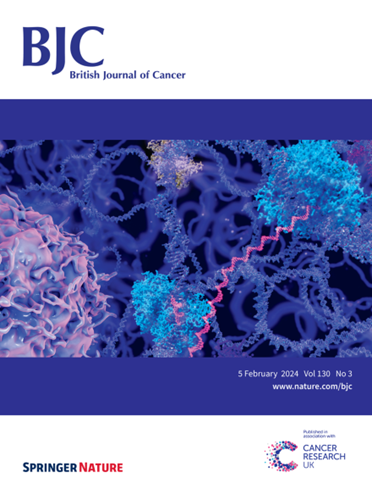Immune profiling of gastric adenocarcinomas in EU and LATAM countries identifies global differences in immune subgroups and microbiome influence
IF 6.4
1区 医学
Q1 ONCOLOGY
引用次数: 0
Abstract
Gastric cancer (GC) patients from European (EU) and especially Latin American (LATAM) countries are underrepresented in previous large-scale multi-omic studies that have identified clinically relevant subgroups. The LEGACY study aimed to profile the molecular and immunological features of GCs from EU and LATAM countries. Tumor biopsies from 95 EU and 56 LATAM GCs were profiled with immunohistochemistry (CD3, CD8, FOXP3, PD-L1, MSI and HER2), Nanostring mRNA expression analyses, and microbiome sequencing. Immune profiling identified four distinct immune clusters: a T cell dominant cluster with enriched activation pathways, a macrophage dominant cluster and an immune excluded microenvironment which were equally distributed among the countries. A fourth cluster of mostly Mexican patients consisted of excessive T cell numbers accompanied by enhanced cytokine signaling in absence of enhanced antigen presentation and cytotoxicity signatures and a strong association with H. pylori infection. Both EU and LATAM countries have GCs with a T cell inflamed microenvironment that might benefit from checkpoint inhibition. We identified a highly inflamed GC subgroup that lacked antigen presentation and cytotoxicity associated with H. pylori CagA-positive strains, suggesting their contribution to tumor immune tolerance. Future studies are needed to unravel whether these cancers benefit from immunotherapy as well.

欧盟和拉丁美洲国家胃腺癌的免疫分析确定了免疫亚群和微生物组影响的全球差异。
背景:来自欧洲(EU),尤其是拉丁美洲(LATAM)国家的胃癌(GC)患者在以前的大规模多组学研究中代表性不足,而这些研究已经确定了临床相关的亚组。LEGACY 研究旨在分析欧盟和拉美国家 GC 患者的分子和免疫学特征:通过免疫组化(CD3、CD8、FOXP3、PD-L1、MSI 和 HER2)、Nanostring mRNA 表达分析和微生物组测序,对 95 例欧盟和 56 例拉美和加勒比海地区癌症患者的肿瘤活检组织进行了分析:免疫图谱分析确定了四个不同的免疫群:T细胞主导群,具有丰富的活化途径;巨噬细胞主导群;免疫排斥微环境,这些免疫群在各国的分布情况相同。第四个群组主要由墨西哥患者组成,其中T细胞数量过多,细胞因子信号转导增强,但抗原呈递和细胞毒性特征没有增强,而且与幽门螺杆菌感染密切相关:讨论:欧盟和拉丁美洲和加勒比海地区国家的 GC 都存在 T 细胞发炎的微环境,可能会从检查点抑制剂中获益。我们发现了一个高度炎症的 GC 亚群,该亚群缺乏与幽门螺杆菌 CagA 阳性菌株相关的抗原呈递和细胞毒性,这表明它们对肿瘤免疫耐受做出了贡献。未来的研究需要揭示这些癌症是否也能从免疫疗法中获益。
本文章由计算机程序翻译,如有差异,请以英文原文为准。
求助全文
约1分钟内获得全文
求助全文
来源期刊

British Journal of Cancer
医学-肿瘤学
CiteScore
15.10
自引率
1.10%
发文量
383
审稿时长
6 months
期刊介绍:
The British Journal of Cancer is one of the most-cited general cancer journals, publishing significant advances in translational and clinical cancer research.It also publishes high-quality reviews and thought-provoking comment on all aspects of cancer prevention,diagnosis and treatment.
 求助内容:
求助内容: 应助结果提醒方式:
应助结果提醒方式:


